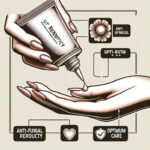Exploring the Link Between Nail Fungus and Overall Health

Getting to Know Nail Fungus and Your Overall Health
Ever noticed your nails acting up, maybe getting thick, discolored, or brittle, and thought nothing of it? Nail fungus is one of those pesky problems many of us dismiss as “just a cosmetic issue,” until it starts affecting our daily comfort or how we feel about ourselves. But here’s the kicker: while it might seem like a minor irritation, nail fungus can sometimes hint at deeper health matters. It’s like your body’s whispering that something might be off, and taking care of your nails could be a stepping stone towards taking better care of your whole self.
Nail fungus, or onychomycosis if you’re feeling technical, is usually triggered by various types of fungi that love to set up camp under your nails. People whose immune systems are on the weaker side or who have other chronic issues tend to get hit by it more often. Catching it early not only eases the discomfort but could also help you dodge bigger health problems down the road. Essentially, those little changes in your nails aren’t just surface-level—they could be your body’s way of signaling that it needs a bit more TLC.
Some common signs to look out for include nails that have become discolored, thick, or even crumbly. At first, it might seem like just a harmless blemish, yet these changes could be a peek into your body’s overall immune health. Paying attention to these symptoms and getting professional advice when needed can really pay off.
What Causes Nail Fungus and Who’s at Risk?
So, how does nail fungus take hold in the first place? Think about environments that are warm and damp—these are the perfect breeding grounds for fungi. Whether it’s a trip to the public pool, a session in a communal shower, or even a humid home, these settings let fungi slip in and make themselves comfortable, especially if your nail is even slightly injured.
Our everyday habits can also be a big factor. If you’re constantly in closed shoes or often wander barefoot in communal places, you might be more prone to picking up the infection. Even skipping on good foot hygiene now and then can weaken your nail’s natural defenses, inviting fungus to take hold and maybe even spread.
And here’s an interesting tidbit—some folks might have a natural predisposition to nail fungus. If it runs in your family, chances are your nails might be more vulnerable to these pesky infections. In such cases, stepping up your hygiene game might not be enough, and a trip to your healthcare provider could be in order to get ahead of potential complications.
How Nail Fungus Could Be Telling You More Than Just a Cosmetic Tale
Nail fungus might seem like a tiny issue, but it can sometimes shine a light on broader systemic problems. If the infection just won’t go away or keeps coming back, it might be hinting at issues with your immune system or even underlying circulatory troubles. Doctors often suggest a deeper health check if their patients have stubborn nail fungus, as it can sometimes link up with cardiovascular problems.
For instance, if your blood circulation is off—say, due to diabetes or peripheral vascular disease—it can make it easier for fungal infections to persist and harder for your body to heal. In these cases, managing nail fungus isn't just about cosmetic fixes; it's part of a bigger picture in keeping your whole body healthy.
Your immune system plays a big role in this whole scenario. When it’s not firing on all cylinders—whether because of chronic illness, stress, or certain medications—fungal infections can become a real nuisance. That’s why looking after your nails might also mean giving a nod to your overall health and making sure your body’s defenses are in top shape.
How Do You Know It’s Nail Fungus and What Can You Do About It?
The first step in tackling nail fungus is to get a proper diagnosis. Health professionals usually start by taking a good look at your nails and might even run some tests to confirm if it’s fungus causing all the trouble. This early, accurate check-up not only speeds up the right treatment but also prevents you from wasting time on the wrong remedies.
Typical treatments include topical antifungal solutions or oral medications, and while they do their job, nail fungus can take its sweet time to improve due to the slow growth of nails. It often takes months of consistent treatment, so sticking to the plan is crucial, even if your nails seem better before the end of the course.
Some people also explore natural remedies like tea tree oil, vinegar soaks, or garlic extract. While these might offer some relief, it’s always a good idea to loop in your doctor, especially if your case is severe. Combining tried-and-true medical advice with a few natural hacks can often give you the best of both worlds.
Preventing Nail Fungus: A Few Simple Habits
When it comes to nail fungus, prevention really is better than cure. Keeping your feet and hands clean and dry is a must. Simple habits like washing well, drying thoroughly, and even using antifungal powders can make a big difference. It’s not just about stopping fungus in its tracks—it also helps fend off other pesky bacteria and infections.
Choosing the right footwear plays a part too. Breathable shoes and avoiding overly damp environments can help reduce the moisture where fungi love to grow. Plus, maintaining a healthy lifestyle with regular exercise and proper nutrition not only boosts your immune system but creates an all-around fortress for your nails and body.
If you’re particularly prone to nail fungus, maybe thanks to conditions like diabetes or poor circulation, regular check-ups with a podiatrist or dermatologist can catch issues early. It’s all about nipping the problem in the bud before it expands into a bigger health concern.
Nail Fungus in Different Groups of People
The way nail fungus shows up can really vary depending on who you are. For older adults, nails might become more brittle with age, making them more susceptible to fungal infections. The slower nail growth that comes with age means treatments might take longer to work, especially if there are other chronic issues in the mix. Special care and periodic check-ups are important for seniors to ensure the treatment is both safe and effective.
Those dealing with chronic illnesses or weakened immune systems face their own set of challenges when it comes to nail fungus. Conditions like diabetes, rheumatoid arthritis, or circulatory issues not only increase the risk but can slow down recovery. For these individuals, managing nail fungus often requires a well-rounded approach that takes the overall health picture into account, sometimes with a team of specialists chipping in.
Athletes and active folks aren’t off the hook either. With constant sweating, tight shoes, and time spent in locker rooms, they’re particularly at risk. For them, special preventive measures like moisture-wicking socks and diligent foot care routines before and after workouts are key to keeping the fungi in check without sidelining their active lifestyles.
Exploring Alternative and Complementary Approaches
Many people are also turning to alternative methods to handle nail fungus alongside traditional treatments. Supplements like biotin, omega-3s, and vitamin E have gained popularity for their potential to support nail health and boost overall immunity. When these supplements work hand in hand with conventional treatments, they can sometimes make the healing process a bit smoother.
There’s also a growing interest in holistic therapies—think acupuncture, herbal remedies, and even aromatherapy—as additional tools to help the body heal naturally. Many find that these approaches complement medical treatments and offer a refreshing, well-rounded way to tackle both the nail fungus itself and any underlying health issues. Of course, it’s important to chat with a healthcare professional to craft a plan that fits your unique situation.
And let’s not forget nutrition! A well-balanced diet packed with vitamins like zinc, vitamin C, and B-complex not only fortifies your immune system but also builds a strong foundation for healthy nails. Filling your plate with fruits, veggies, lean proteins, and whole grains isn’t just good for your nails—it’s a recipe for overall health and resilience.
Looking Ahead: The Future of Nail Fungus Research and Final Thoughts
The research on nail fungus keeps evolving, with promising new therapies on the horizon that could lead to more effective, targeted treatments. Recent studies are exploring genetic and autoimmune links, and these breakthroughs might soon unlock new pharmaceutical options. Scientists are even testing new topical formulas and extended-release medications, all aiming to speed up recovery and reduce the typical side effects.
Even though we’ve learned plenty, there’s still so much to uncover about the exact ties between nail fungus and broader health concerns, like cardiovascular issues or immune system hiccups. Ongoing research is vital, and as our understanding deepens, we can expect more innovative treatments and preventive strategies that integrate nail care into our overall health regime.
To sum it all up, nail fungus isn’t just a cosmetic nuisance—it can signal important aspects of your health. Recognizing the signs early and tackling them with a blend of medical treatments, natural remedies, and smart lifestyle choices can make a huge difference. By keeping your nails and your body in sync, you’re not only looking after your appearance but ensuring a healthier, more balanced life overall.





